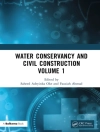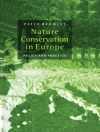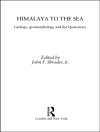This book is proposed to be a collection of excellently peer-reviewed research from the 2023 14th International Conference on Environmental Science and Development (ICESD 2023), which will be held during May 25-27, 2023, in Xiamen, China. ICESD 2023 will gather innovative academics and industrial experts to a common forum to facilitate the exchange of scientific information and its application in the field of Environmental Science and Sustainable Development. Particularly, a large amount of the research is related to the Water Governance Programme which is an initiative as developed by the China International Center for Economic and Technical Exchanges, United Nations Development Programme, and Coca-Cola China.
Recently, effects of energy crisis, water scarcity, environmental pollution, climate change, COVID-19 pandemic, and their interactions on eco-environment and health have caused extraordinary risks in socio-economic and environmental systems (SEE). Such risks feature dynamic, uncertain, and interactive characteristics. In order to tackle these risks, cutting-edge technologies, including both experimental approaches and modeling ones, are desired urgently. Particularly, nature-based solutions will be developed to help achieve net-zero emission and United Nations Sustainable Development Goals. In addition, data-driven and AI-based methodologies will be developed to facilitate policy analysis of SEE under New Normal scenarios. Furthermore, the combinations of multiple approaches are expected to support the enhancement of SEE resilience in a post-pandemic future. Consequently, ICESD 2023 will include presentations in the field of Water Resources Management, Wastewater Treatment, Drinking Water Safety, Energy and Environmental Systems Analysis, Air Pollution Control, Solid Waste Management, Sustainable Development, Ecosystem Restoration, Climate Change Adaptation, and Socio-economic and Environmental Management. Excellent papers related to these topics would be enclosed in this proposed book.
Cuprins
Water resources management.- Wastewater treatment and drinking water safety.- Air pollution control.- Solid waste control.- Ecosystem management and sustainable development.
Despre autor
Dr. Gordon Huang is Canada Research Chair (Tier 1) in Energy and Environment and Executive Director of the Institute for Energy, Environment and Sustainable Communities at the University of Regina, Canada. He holds B.Sc. from Peking University (China), M.Sc. from Simon Fraser University (Canada), and Ph.D. from Mc Master University (Canada). Since 1990s, Huang has led over 150 research projects, produced over 800 peer-refereed international journal papers (with an SCI-based H-index of 51 in Science Citation Index under Thomson Reuters’ Web of Science), and supervised over 100 master’s/Ph.D. students (with degrees awarded). Over 20 Huang’s Ph.D. graduates were appointed as Faculty Members at universities in Canada, USA, China, and Singapore. He is Fellow of the Canadian Academy of Engineering and President of the International Society for Environmental Information Sciences. He also acts as Editor-in-Chief for Journal of Environmental Informatics and serves the United Nations Development Programme as Chief Scientist for a program of Rural Water Resources Management and Drinking Water Safety. His pioneering work in environmental risk management has been recognized as a significant innovation and has influenced government and business approaches for tackling environmental challenges and formulating related policies.
Dr. Yongping Li is Professor at Beijing Normal University, China. She received her M.Sc. and Ph.D. degrees from the University of Regina, Canada. Her research interests involve in energy and environmental systems analysis, environmental pollution control, water resources management, and decision-making under uncertainty. Dr. Li has led or involved in over 50 energy- and environment-related research projects supported by industrial, governmental, and international organizations. She has produced over 350 peer-refereed international journal papers (with an SCI-based H-index of 40 in Science Citation Index under Thomson Reuters’ Web of Science) and supervised over 70 master’s/Ph.D. students. She has been continuously selected as a highly cited scholar in the field of “environmental science” (by Elsevier) since 2013. She was recently included in Stanford University’s 2020 World Ranking for the world’s top 2 percent of most-cited scientists in the field of Environmental Engineering. Dr. Li received a number of awards such as Distinguished Young Scientist Award, New Century Excellent Talents in University, the National Natural Science Funds for Distinguished Young Scholar, the National Award for Youth in Science and Technology, and the National Award for Youth Female Scientist.
Dr. Changping Chen is Professor and President at Xiamen Ocean Vocational College. He obtained his Ph.D. from Hunan University (China). Dr. Li has led or involved in over 30 research projects supported by industrial, governmental, and international organizations. He has produced over 80 peer-refereed international journal papers and supervised over 20 master’s/Ph.D. students.
Dr. Peng Zhang is Research Scientist of the Institute for Energy, Environment and Sustainable Communities at the University of Regina, Canada. He holds Ph.Ds. from Nankai University (China) and University of Regina (Canada). His research is focused on nature-based wastewater treatment, environment-related material development, soil remediation, and synchrotron-based environmental analysis. Since 2009, Dr. Zhang has led or involved in over 25 research projects and has produced over 30 peer-refereed journal papers. He is an Engineers-in-training of the Association of Professional Engineers and Geoscientists of Saskatchewan, Canada (APEGS). He also acts as Managing Editor of Journal of Environmental Informatics and Guest Editor of Journal of Chemistry. In addition, he is appointed as a Water Resources Specialist for the Water Governance Programme which is an initiative as developed by China International Center for Economic and Technical Exchanges, United Nations Development Programme, and Coca-Cola China.












